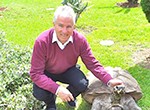 The hardest of hearts must have been softened by the improvement in Anglo-Irish relations in recent years. The Queen’s speech in 2011 at the state dinner in Dublin Castle, with its apology for “things we wish had been done differently or not at all,” was a remarkable occasion. Think about an Irish television audience of half a million people watching the Queen planting a tree—it was, and is, a big deal.
The hardest of hearts must have been softened by the improvement in Anglo-Irish relations in recent years. The Queen’s speech in 2011 at the state dinner in Dublin Castle, with its apology for “things we wish had been done differently or not at all,” was a remarkable occasion. Think about an Irish television audience of half a million people watching the Queen planting a tree—it was, and is, a big deal.
The dearly beloved and I were in Dublin just before the reciprocal state visit of the Irish president to the UK. Keen to improve our shamefully sketchy knowledge of Irish history, we took a walking tour of Dublin. Just the two of us and a young man with a degree in medieval and Celtic Irish studies, and a knowledge and passion that went far wider. We were mesmerised, and the time flew by. But walking together into Trinity College, it all looked strangely familiar. I’d never been there before, and yet it felt like I had. It took a couple of minutes and then it came to me.
Educating Rita was filmed at Trinity 30 years ago. I (eventually) realised I wasn’t experiencing some strange neurological syndrome, and that I’d first seen those handsome buildings and squares in the Hollywood Plaza, Scarborough. Classic pattern recognition, of course. Evolution has given us brains that remember pictures and sounds amazingly well. See or hear something or someone a few times and it may stick in our memory for many years. As doctors, we exploit that innate ability when making one of those not to be missed rare diagnoses based on a constellation of signs and symptoms that we learnt years ago. It might be that magical once in a lifetime diagnostic moment, but it isn’t magic or intuition; it’s hard work learning the patterns, and then it’s an evolutionary trait that (hopefully) deploys them.
But let’s not kid ourselves, we are fallible and always will be. We might aspire to be Mr Spock from Star Trek— having encyclopaedic knowledge and deploying it to make perfectly rational decisions. But we can’t. For a particular situation it isn’t possible to read, learn, and use optimally every piece of information that might be useful. Not forgetting that our own and our patients’ values and preferences are legitimate ingredients in decisions. We’re much more like Captain Kirk, and our rationality is bounded. The usual approach we and our patients employ is to collect just enough information to reduce our uncertainty and reach a point at which we are able to make a decision.
The Long Room in Trinity College library is immense: a hundred metres long with ancient books stacked both sides 10 metres high and more. Information overload may be a modern concept, but it’s a problem that is centuries old. We can’t fix this, but knowing a little about how we as humans acquire and use information (or how we don’t) in decision making has to be better than not knowing.
In medicine we are only just starting to unlock this in the hope that the more we work actively at understanding our own information management and decision making, the less likely it is we’ll have to apologise once again for “things we wish had been done differently or not at all.” It’s a big deal.
Competing interests: I declare that I have read and understood the BMJ Group policy on declaration of interests and I hereby declare the following interests: Employed part time by the National Institute for Health and Care Excellence.
Neal Maskrey‘s early career was as a GP before spending seven years as a medical manager and part time GP. After twelve years as a director of the National Prescribing Centre and programme director at NICE, he is now honorary professor of evidence-informed decision making at Keele University, and consultant clinical adviser in the Medicines and Prescribing Centre, NICE.
